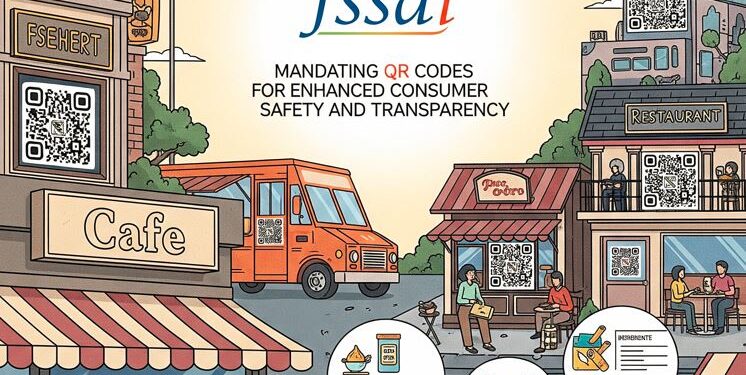-KH News Desk (cbedit@imaws.org)
In a bold stride toward empowering consumers and tightening food safety oversight, the Food Safety and Standards Authority of India (FSSAI) issued a landmark advisory on July 25, 2025, commanding all Food Business Operators (FBOs)—from humble dhabas to upscale cafés and sprawling food-processing units—to prominently display a QR code linked to the “Food Safety Connect” mobile app alongside their FSSAI license or registration certificate. This decisive mandate aims to transform Indian consumers from passive diners into active watchdogs of food hygiene and compliance.
What’s Changing in Food Premises?
Under the new advisory, FBOs must display their license and the associated QR code in clear, high-traffic customer areas—entrances, billing counters, or seating zones—to ensure visibility and accessibility. Going a step further, this QR code or a direct download link for the Food Safety Connect app must also be featured on an establishment’s digital platforms, such as websites, online menus, and food-ordering channels.
This initiative aligns seamlessly with Condition No. 1 of the Food Safety and Standards (Licensing and Registration of Food Businesses) Regulations, 2011—reinforcing India’s commitment to transparency and consumer protection.
How the Food Safety Connect App Amplifies Consumer Power
The Food Safety Connect app—developed by FSSAI—is a user-centric platform designed to streamline consumer feedback and enhance regulatory responsiveness. Through the app, users can:
- File complaints about poor hygiene, unsafe practices, or misleading food claims.
- View licensing details of the FBO.
- Stay abreast of regulatory alerts and food-safety updates.
Crucially, every complaint registered via the app is automatically forwarded to the relevant jurisdictional authorities, enabling quicker investigative response and resolution.
By putting a smartphone in every patron’s hand, FSSAI is not only reinforcing consumer rights but also weaving a real-time feedback loop into India’s food safety network.
What This Means for the Food Industry
For food businesses across India, the task at hand involves strategic placement and awareness:
- Physical visibility must be ensured—licenses and QR codes are to be displayed in high-traffic customer zones.
- Digital presence plays a critical role, with QR codes or app links expected across websites, menus, and online ordering platforms
- Businesses should also educate staff and customers on the purpose and benefits of the app—empowering usage proactively
This regulatory pivot marks a cultural shift, demanding that food establishments not just meet baseline compliance—but actively participate in building trust and accountability.
Consumer Experience: From Scanning to Action
Imagine stepping into your favorite café and noticing a small QR code sticker beside the menu stand. With a simple scan, you can:
- Confirm the outlet’s licensing status.
- Report unclean utensils or mislabelled dishes with a few taps.
- Stay updated on food safety alerts or policy changes.
Such seamless, real-time interaction integrates food safety awareness into everyday life—making it preventive and participative, rather than regulatory and reactive.
A Wider Vision: Digital Governance Meets Public Health
This QR-enabled initiative is emblematic of FSSAI’s broader vision to digitize food-safety oversight and engage citizens as active stakeholders in regulatory enforcement. It complements other recent efforts—such as revising standards for ready-to-eat products, launching safer packaging protocols, and updating licensing norms—to deepen a culture of compliance and safety.
By deploying the Food Safety Connect app across physical and digital platforms, FSSAI signals a clear intent: a transparent, technology-driven ecosystem where consumers, businesses, and authorities collaborate for a safer food environment.
The FSSAI’s new directive—mandating QR code display of the Food Safety Connect app—is not merely a compliance checkbox, but a powerful invitation to citizens to engage, report, and watch over the food they consume. It represents a paradigm shift in food safety, bringing digital accountability directly to customers’ fingertips.
Through visible labels and discreet QR codes, every food outing becomes an opportunity for safe, informed choices. With consumers empowered and businesses held to higher standards, India’s food safety landscape is poised for a transformative, tech-powered future.







